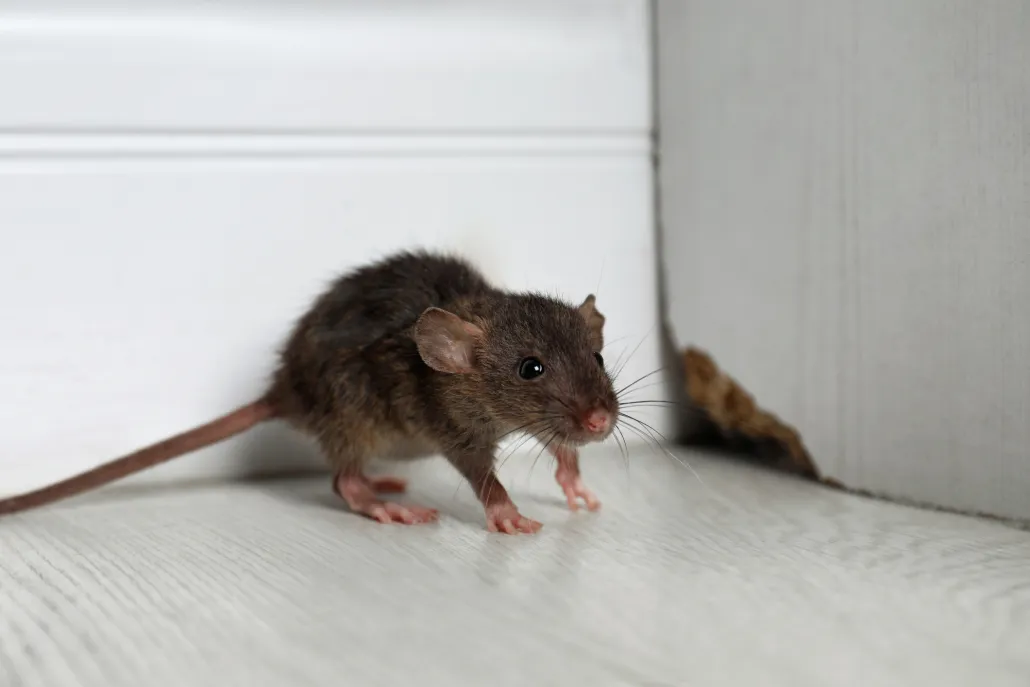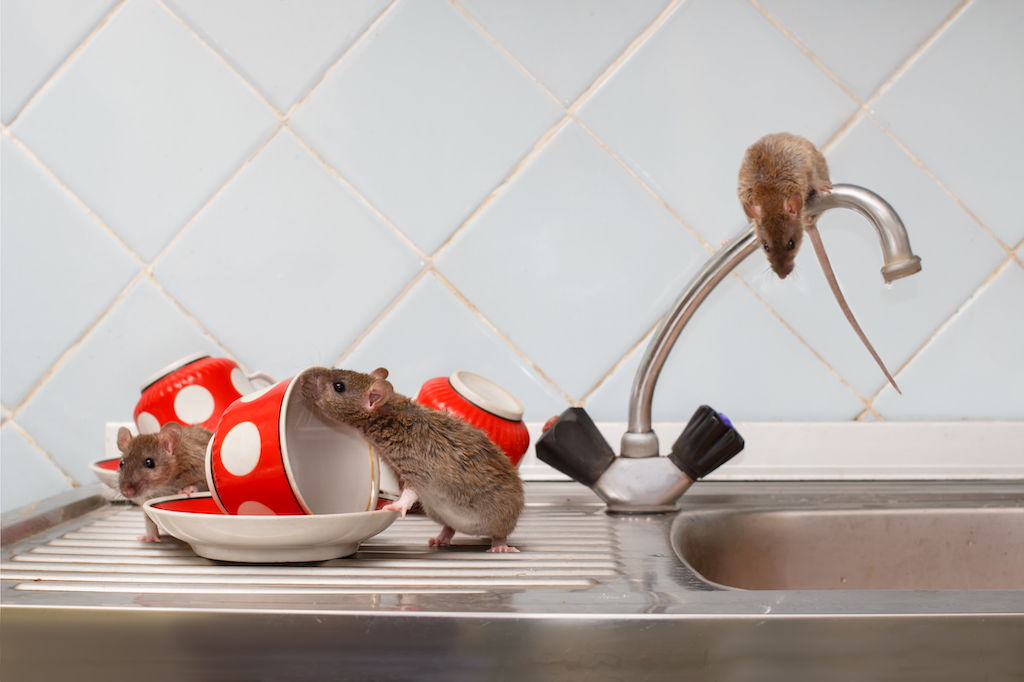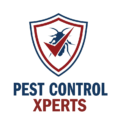Florida’s subtropical climate boasting moderate winters, high humidity, and year-round warmth allows rodents (mice, rats) to stay active and reproduce consistently. In Panama City, a Gulf Coast hub in Florida’s Panhandle, these adaptable pests often creep into single-family homes, short-term rentals, or commercial properties when leftover food scraps, moist corners, or easy entry points entice them. This page uncovers why rodents thrive in Florida, how to detect a potential infestation, and why bringing in a professional exterminator specializing in rodent treatments is essential to safeguarding your indoor spaces from contamination, property damage, and health hazards.
Whether you own a residence in Panama City or manage rentals across Panama City Beach and Lynn Haven, identifying rodents early and deploying comprehensive, multi-stage solutions protects occupants from possible droppings-borne bacteria, gnawing on wooden structures or wiring, and the frustration of repeated do-it-yourself efforts that often miss concealed pups or newly arrived rodents exploiting Florida’s mild winter climate.
Why Rodents Flourish in Florida
Mild Winter Temperatures
In cooler regions, freezing winters greatly suppress rodent breeding for months. Florida’s gentle cold season rarely reaches freezing, allowing mice and rats to feed, mate, and produce litters indoors or outdoors year-round. Climate-controlled properties (around 65–85°F) further remove seasonal pauses, expediting rodent population growth if occupant or property manager vigilance dips.
Convenient Food & Moisture Sources
Rodents consume virtually any organic scraps, kitchen leftovers, open pantry goods, or pet food left uncovered. In busy Panama City homes or lodging, occupant patterns might inadvertently furnish rodents an easy meal if daily cleaning or trash removal lapses. Even minor pipe leaks or air conditioner condensation supply necessary water in Florida’s humidity, making it simpler for rodents to nest and breed.
Rapid Breeding Cycles
A single female mouse or rat can bear multiple litters annually, each with multiple pups that quickly grow into adults. Overlooking minimal droppings or chewing evidence swiftly leads to multiple rodent families nesting behind walls, in attic spaces, or under appliances if occupant or professional checks stall.
Access Through Small Openings
Mice squeeze through dime-sized cracks, while rats need openings the size of a quarter. In older residences or newly built structures lacking thorough sealing, rodents find it easy to slip behind drywall, typically unnoticed until occupant sightings like droppings or nighttime scuttling confirm their presence.
Movement of Goods & People
Florida’s relocations, occupant turnover, and short-term rentals often shuffle furniture, boxes, or belongings, offering rodents unobserved transit between properties. In multi-unit dwellings around Panama City Beach or Lynn Haven, occupant or staff oversight may allow mice or rats to shift from one unit to another if occupant vigilance or housekeeping is inadequate.

Signs of a Rodent Infestation
- Droppings
- Tiny, rod-shaped pellets (¼ inch long), often pointed at both ends, found along baseboards, behind cabinets, or under sinks.
- Fresh droppings are dark and moist; older ones become grayish and crumbly if touched.
- Tiny, rod-shaped pellets (¼ inch long), often pointed at both ends, found along baseboards, behind cabinets, or under sinks.
- Chewed Packaging & Gnaw Marks
- Rodents nibble cardboard, plastic, or even thin wood to keep their incisors in check.
- Torn corners on cereals or pet food bags generally confirm rodent feeding attempts.
- Rodents nibble cardboard, plastic, or even thin wood to keep their incisors in check.
- Nocturnal Scratching or Squeaking
- Mice or rats forage at night, producing faint squeaks or rustling in walls, under floors, or attic spaces.
- Regular noise typically suggests a larger or more established colony.
- Mice or rats forage at night, producing faint squeaks or rustling in walls, under floors, or attic spaces.
- Shredded Nest Material
- Bits of paper, fabric, or insulation arranged in hidden corners basements, attics, behind large appliances.
- Foul odors or droppings near nest sites confirm active rodent presence.
- Bits of paper, fabric, or insulation arranged in hidden corners basements, attics, behind large appliances.
- Unusual Pet Behavior
- Cats or dogs intensively watching walls, pawing under stoves, or barking at vacant corners often detect rodent activities occupant hearing can’t.
- A sudden pet fixation in a previously ignored area strongly implies hidden mice or rats.
- Cats or dogs intensively watching walls, pawing under stoves, or barking at vacant corners often detect rodent activities occupant hearing can’t.
- Ammonia-Like Odors
- Accumulated droppings or rodent urine yield a stale, pungent smell in confined zones.
- Heavier odors usually indicate longer infestations or bigger colonies nesting.
- Accumulated droppings or rodent urine yield a stale, pungent smell in confined zones.
Why Neglecting Rodents Is Dangerous
Health & Contamination Risks
Rodents often host or transport pathogens (like salmonella) in droppings, saliva, or urine. Occupant contact with contaminated surfaces or foods can lead to illness. Inhaling dust from dried feces also threatens occupant respiratory health.
Structural & Electrical Damage
Mice and rats gnaw wiring insulation, wood framing, or drywall edges, risking electrical shorts or fires if occupant or staff detection is delayed. Repairing frayed wires or severely chewed beams can become expensive and inconvenient.
Unchecked Reproduction
Florida’s mild winter fosters near-continuous rodent breeding. A minimal infiltration can spawn multiple nests behind walls, in attics, or across floors if occupant or manager vigilance falters, intensifying occupant problems.
Parasite Spread
Rodent nests occasionally harbor fleas or ticks, imposing extra occupant or pet challenges if these parasites travel beyond nest zones. Stray cats or snakes might appear near properties teeming with mice, complicating occupant or manager responsibilities.
Occupant & Rental Concerns
Short-term rental owners or property managers around Panama City Beach or Lynn Haven risk occupant complaints or brand damage if rodents roam occupant areas. Homeowners likewise endure occupant tension or repeated disinfecting if rodents keep returning.

Why a Professional Exterminator for Rodent Treatments Is Crucial
Thorough Inspection
A rodent exterminator examines attics, basements, or crawl spaces plus behind kitchen appliances for droppings, shredded nesting, or gnaw marks. Identifying mice vs. rats dictates if snap traps, tamper-resistant stations, or specialized approaches are the best fit.
Precision Baiting & Trapping
Experts deploy snap traps or enclosed bait stations along rodent runways baseboard edges, under cabinets ensuring lethal captures without risking occupant or pet safety. Random occupant usage of poisons or unprotected traps frequently yields limited kills or occupant hazards if incorrectly placed.
Safe Rodenticide Applications
Scattering poisons can harm occupant pets or children if misapplied. Exterminators secure rodenticides in locked bait stations, guaranteeing lethal ingestion solely by rodents. Mice or rats commonly die discreetly in nest areas or outdoors, trimming occupant disposal tasks. This far outdoes occupant do-it-yourself attempts that pose risk.
Exclusion & Prevention
Eliminating active rodents is half the solution. Exterminators highlight occupant or staff sealing tasks filling foundation cracks, repairing door sweeps, or closing utility gaps preventing new mice or rats from entering. Occupant synergy ensures a rodent-proof property in Florida’s mild winter environment conducive to rodent survival otherwise.
Follow-Up & Service Plans
Leftover pups may mature weeks after occupant sightings cease, or new rodents may locate previously missed openings. Many exterminators re-check occupant or manager feedback or set follow-up visits if droppings reappear, adjusting occupant housekeeping or re-placing baits until occupant certainty of a rodent-free environment.
Common Rodent Treatment Methods
- Inspection & Colony Scale
- Professionals investigate attics, basements, or behind appliances for droppings, shredded nest scraps, or gnaw marks.
- Determining how extensive or widespread the issue clarifies partial or entire-property coverage.
- Professionals investigate attics, basements, or behind appliances for droppings, shredded nest scraps, or gnaw marks.
- Trapping (Snap or Live)
- Snap traps promptly reduce adult mice if placed carefully near walls or corners.
- Live traps might cater to occupant preferences for minimal kills but are less useful for large outbreaks.
- Snap traps promptly reduce adult mice if placed carefully near walls or corners.
- Bait Stations
- Tamper-resistant stations containing rodenticide blocks ensure occupant or pet safety from exposed poison.
- Rodents typically die indoors or outside after ingesting lethal doses, curbing occupant disposal tasks.
- Tamper-resistant stations containing rodenticide blocks ensure occupant or pet safety from exposed poison.
- Exclusion & Structural Repairs
- Occupants or pros seal foundation cracks, fix door sweeps, fill utility holes, or rectify leak issues.
- Blocking re-entry is vital once occupant synergy plus professional extermination remove current rodent populations.
- Occupants or pros seal foundation cracks, fix door sweeps, fill utility holes, or rectify leak issues.
- Sanitation & Decluttering
- Occupants store leftover food in sealed containers, discard daily scraps, or wipe counters thoroughly.
- Reducing cardboard boxes or random storage corners eliminates hidden nest spots.
- Occupants store leftover food in sealed containers, discard daily scraps, or wipe counters thoroughly.
- Droppings & Odor Removal
- Clearing out droppings or sanitizing nest sites erases pheromone trails that entice new rodents.
- Occupants or specialized crews handle droppings carefully to avoid occupant respiratory exposure to contaminated dust.
- Clearing out droppings or sanitizing nest sites erases pheromone trails that entice new rodents.
- Maintenance & Re-Check
- Pup or new rodent arrivals might emerge weeks after occupant sightings fade, or new mice find overlooked openings.
- Pup or new rodent arrivals might emerge weeks after occupant sightings fade, or new mice find overlooked openings.
Additional occupant housekeeping or re-placing baits ensures occupant calm and no leftover rodent pockets remain undetected.

Service Areas: Panama City, Panama City Beach, Lynn Haven
While rodents adapt strongly to Florida’s year-round mild climate, occupant synergy plus specialized rodent treatments remain critical across Panama City and adjacent Panama City Beach, Lynn Haven. Florida’s gentle cold season seldom hinders rodent breeding, making occupant vigilance and professional extermination crucial for removing or preventing deeper infestations that compromise occupant health or property integrity.
Why Choose Us
Florida-Specific Solutions
We unify recognized rodent control snap traps, locked bait stations, thorough sealing alongside occupant housekeeping adapted for Florida’s environment. By merging occupant synergy, disposing of food scraps, eliminating dampness and advanced exterminator coverage, we handle adult mice or rats plus future litters, outperforming occupant tries that skip concealed nest pockets or newly birthed pups.
Detailed Assessments
Before placing baits or traps, technicians meticulously inspect behind appliances, attic corners, or basement edges for droppings, shredded nest items, or gnaw marks. This scope reveals whether localized or entire-building coverage best suits occupant needs.
Safe, Strategic Usage
Professionals apply rodenticides exclusively in tamper-resistant stations, protecting occupant pets or children while ensuring lethal rodent ingestion. Snap traps set along typical rodent runways expedite kills. Minimizing occupant chemical exposure but thoroughly dealing with mice or rats stands at the core of our approach.
Exclusion & Occupant Housekeeping
Removing existing rodents is half the solution. Occupants or professionals then seal cracks, repair door sweeps, or caulk utility penetrations so new mice or rats can’t breach. Occupant synergy like storing leftover foods properly further stabilizes a rodent-free interior in Florida’s rodent-friendly mild winter climate.
Follow-Up & Extended Assurance
Rodent pups might emerge weeks after occupant sightings vanish, or new mice might utilize previously missed openings. Many exterminators re-check occupant or manager calls if droppings reappear, refining occupant housekeeping or re-placing baits until occupant certainty that no hidden rodent clusters remain.
Next Steps
Noticing rodent droppings behind baseboards, hearing faint scratching in walls at night, or discovering chewed pantry items? Contact us to learn more or schedule your service. Our rodent treatments for Panama City and covering Panama City Beach, Lynn Haven mix detailed property checks, strategic snap traps or enclosed bait stations, occupant-led sealing and sanitation, plus continued follow-ups comprehensively eradicating rodent populations while restricting new entries.
Act swiftly to defend occupant health from droppings-borne bacteria, safeguard wiring and structural wood from gnaw damage, and maintain occupant or guest trust if you manage short-term rentals or multi-unit buildings. Turn to our Florida-based exterminator expertise in rodent solutions to locate, remove, and deter mice effectively, overriding their mild winter breeding advantage along Florida’s Gulf Coast for occupant safety year-round.
